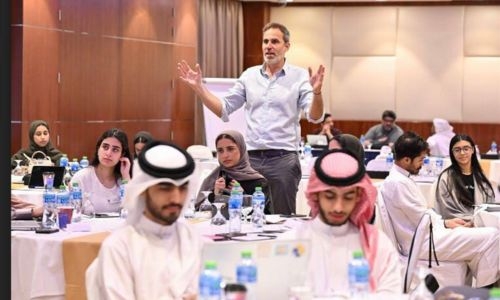The European Union delegation to the Kingdom of Bahrain recently collaborated with the EU-GCC Cooperation on Green Transition project and the EU Outreach Facility for the GCC to organize a Conference of the Parties (COP) simulation games for youth. This initiative was part of the 7th edition of the ‘Young Parliamentarian’ programme, an annual youth empowerment initiative held under the patronage of His Excellency Ali bin Saleh Al Saleh, Chairman of the Shura Council. Over two days, 42 young Bahraini students and professionals aged 16 to 30 participated in workshops and simulations designed to raise awareness about climate change and the importance of driving global climate action.
The participants assumed roles as representatives of various countries — including industrialized nations, emerging economies, and developing countries such as Bangladesh, Brazil, China, the European Union, India, Japan, Morocco, Nigeria, the United Arab Emirates, and the United States — to engage in simulated COP negotiations. Theo Lemaire, Political Officer and EU Focal Point for Bahrain, emphasized the significance of the simulation as an immersive learning experience that highlights the complexities of balancing national interests with global responsibilities in addressing climate change.
By engaging Bahraini youth in these simulation games, the European Union aims to foster a new generation of leaders equipped with the knowledge and skills to contribute to global climate solutions. The initiative reinforces the EU’s commitment to sustainability and empowers young voices in the climate discourse. The simulation games enhanced participants’ understanding of the diverse roles that individuals, civil society, and political actors play in championing climate action. They also had dedicated sessions on international negotiations and the European Union’s flagship policy, the European Green Deal, which outlines the EU’s commitment to tackling climate change and achieving a sustainable future.
The European Union’s collaboration with Bahraini youth in organizing the COP simulation games reflects a growing recognition of the importance of engaging young people in climate action. By providing them with an immersive learning experience that replicates real-world negotiations, the initiative equips youth with the knowledge and skills needed to contribute meaningfully to global efforts in addressing climate change. The involvement of young leaders in these simulations demonstrates a commitment to empowering the next generation to drive positive change and advocate for sustainable solutions to environmental challenges.
Through the simulation games, participants gained firsthand experience in navigating the complexities of international negotiations on climate change. By role-playing as representatives of different countries, they had to grapple with the various interests and priorities at play in global climate action. This exercise not only deepened their understanding of the challenges involved in addressing climate change but also honed their skills in diplomacy, negotiation, and advocacy. Such immersive experiences are invaluable in preparing young leaders to engage effectively in global dialogues on climate policy.
The EU delegation’s support for the COP simulation games underscores the importance of engaging youth in climate action at a time when urgent and collective efforts are required to combat the growing threats of climate change. By empowering young leaders with the knowledge, skills, and confidence to advocate for sustainable solutions, initiatives like the ‘Young Parliamentarian’ programme play a crucial role in building a more resilient and environmentally conscious future. Through collaborative efforts between governments, international organizations, and youth, we can work towards a more sustainable world for generations to come.











